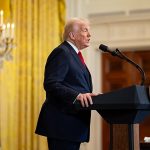President Trump met with Chinese leader Xi Jinping on the sidelines of the APEC summit in Busan on October 30, 2025, in a meeting that marked their first face-to-face talks in years and sent shockwaves through the global economic and political establishment. The summit was billed by U.S. officials as the culmination of intense negotiations and a chance to reset a fraught U.S.-China relationship after months of high-stakes bargaining and trade threats.
Officials on both sides say negotiators reached a substantial framework that touches on tariffs, agricultural purchases, export controls on critical minerals, fentanyl precursor chemicals, and even the future of TikTok’s operations in America. What was once endless saber-rattling in the newspapers has been converted into concrete leverage at the bargaining table — exactly the outcome conservatives have been demanding for years.
The president left the meeting talking about a “fantastic relationship” and calling Xi a “very tough negotiator,” language that may rile the usual suspects on the left but reflects a successful takeaway: Trump negotiated from strength and got China to move on issues that matter to American workers and national security. That kind of blunt, deal-focused diplomacy is what voters wanted when they put him back in the White House, and it’s exactly what our country needs to protect jobs and supply chains.
Conservative voices on Fox rightly celebrated the outcome, pointing out that this administration chose to use tariffs, targeted pressure, and clear demands rather than naive appeasement or hollow rhetoric. Commentators like Jason Chaffetz and Kaylee McGhee White underscored that winning at the negotiating table requires toughness and clear objectives — traits the president displayed in Busan while Pelosi-era politicians and woke media practiced their usual hand-wringing.
Make no mistake: the Chinese Communist Party remains an adversary when it comes to intellectual property theft, coercive economic practices, and strategic ambitions in the Indo-Pacific, and conservatives must remain vigilant about Taiwan, rare-earth control, and technology transfers. The framework that emerged should be treated as a first step, not the finish line; we must demand enforceable guarantees and congressional oversight so American security and sovereignty are never traded away for a photo op.
Patriotic Americans should cheer that our president brought the fight to Beijing in a way that produced results instead of another round of empty statements and virtue-signaling. This administration has shown it will use tariffs and leverage to protect American interests, and now Congress and the public must back those moves instead of allowing career bureaucrats and Democrats to undercut hard-won gains.
If Democrats and the legacy media think they can smear a pragmatic, pro-worker deal because they can’t stand who’s sitting in the Oval Office, they’re badly misreading the country. Ordinary Americans know the difference between weak bluster and effective negotiation — and after Busan, the choice is clearer than ever: support strength, hold the line on security, and let the men and women who build America reap the benefits of a president who actually negotiates.




